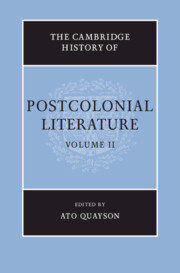Book contents
- Frontmatter
- 21 The language question in India and Africa
- 22 English and the development of postcolonial literature
- 23 Religion and postcolonial writing
- 24 Postcolonial responses to the Western canon
- 25 Island writing, Creole cultures
- 26 Magical realism
- 27 Palimpsest and hybridity in postcolonial writing
- 28 The narrative forms of postcolonial fiction
- 29 Poetry and postcolonialism
- 30 Primitivism and postcolonial literature
- 31 Popular culture and postcolonial literary production in Africa and India
- 32 Film and postcolonial writing
- 33 Fanon, Memmi, Glissant and postcolonial writing
- 34 Negritude and postcolonial literature
- 35 Publishing, prizes and postcolonial literary production
- 36 Key journals and organizations
- Bibliography
- Index
- References
24 - Postcolonial responses to the Western canon
Published online by Cambridge University Press: 28 January 2012
- Frontmatter
- 21 The language question in India and Africa
- 22 English and the development of postcolonial literature
- 23 Religion and postcolonial writing
- 24 Postcolonial responses to the Western canon
- 25 Island writing, Creole cultures
- 26 Magical realism
- 27 Palimpsest and hybridity in postcolonial writing
- 28 The narrative forms of postcolonial fiction
- 29 Poetry and postcolonialism
- 30 Primitivism and postcolonial literature
- 31 Popular culture and postcolonial literary production in Africa and India
- 32 Film and postcolonial writing
- 33 Fanon, Memmi, Glissant and postcolonial writing
- 34 Negritude and postcolonial literature
- 35 Publishing, prizes and postcolonial literary production
- 36 Key journals and organizations
- Bibliography
- Index
- References
Summary
‘It was as if a Briton, of the time of Severus, had suddenly written a poem in good Latin’, read the 1829 Oriental Herald Review appraisal of the 1827 and 1829 volumes of Henry Derozio’s poetry. This was high praise indeed by a reviewer (quite possibly the editor of the Oriental Herald, J.S. Buckingham) who had earlier puzzled over the viability of Indian writing in English: ‘the very language … can hardly be called English’. The poet in question was Henry Louis Vivian Derozio, a Calcutta ‘Eurasian’ of Portuguese and Indian ancestry, and a pioneer Indian English writer. Derozio’s poems imagined and apostrophized a unified India from the limited scope of the plains of ‘Bhaugulpore’ or the rock of ‘Jungheera’ and gave tremulous form to its nascent nationalist imagination. Derozio’s elegiac poems of India situate him as a belated arrival to the once glorious but now subjugated country. In ‘The Harp of India’ (March 1827), for instance, he writes:
Thy music once was sweet – who hears it now?
Why doth the breeze sigh over thee in vain?
Silence hath bound thee with her fatal chain;
Neglected, mute, and desolate art thou,
Like ruined monument on desert plain!
Derozio’s ‘postcoloniality’ inheres not in dates but in the postimperial tone of the nationalist poetry. And his enthusiastic appropriation of the English literary canon to write of the emancipation of India testifies to the predicament of the postcolonial writer, whose conscious or unconscious affiliation and allusiveness to the Western literary tradition is an inheritance that is often as unwanted as it is laboured for.
- Type
- Chapter
- Information
- The Cambridge History of Postcolonial Literature , pp. 771 - 801Publisher: Cambridge University PressPrint publication year: 2012
References
- 1
- Cited by



